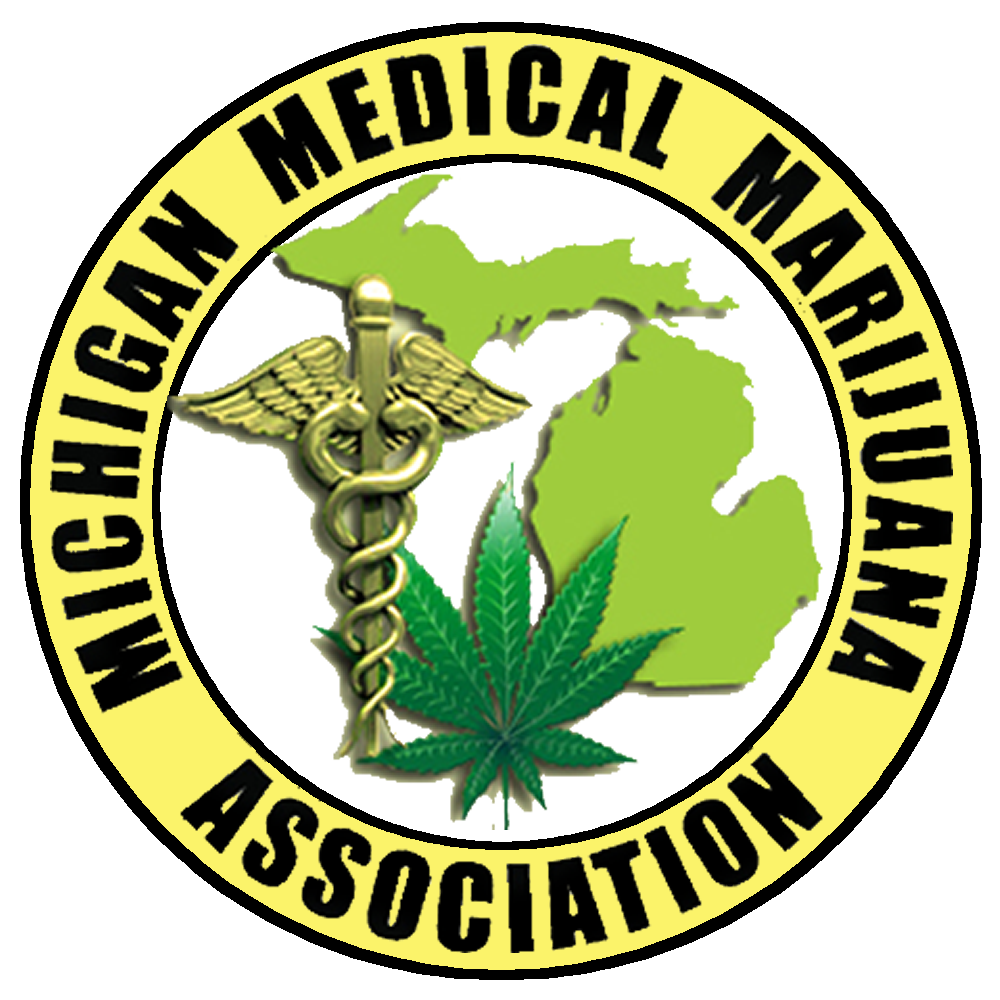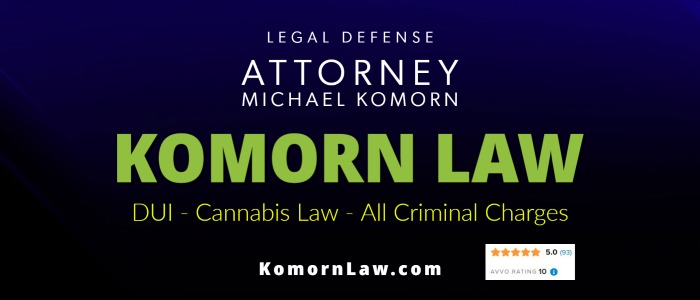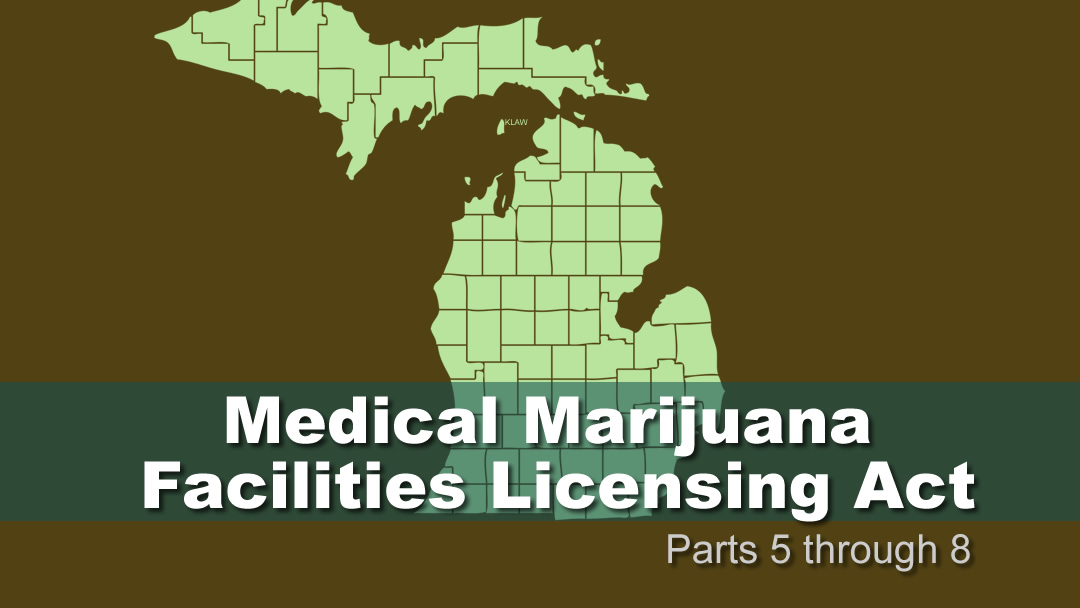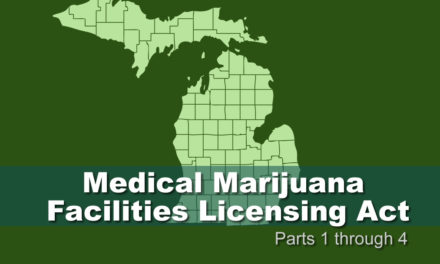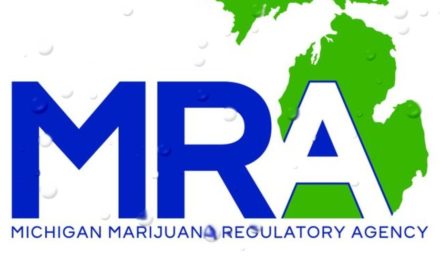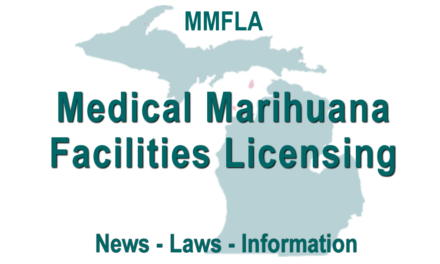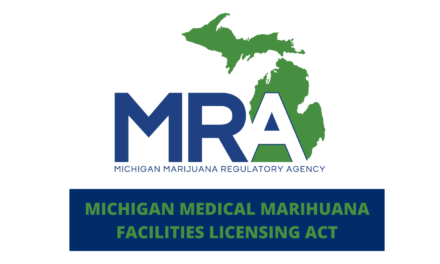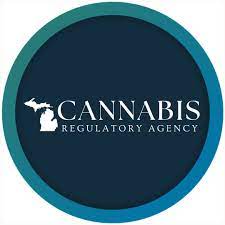MEDICAL MARIHUANA FACILITIES LICENSING ACT
Act 281 of 2016
PARTS 5-8
AN ACT to license and regulate medical marihuana growers, processors, provisioning centers, secure transporters, and safety compliance facilities; to provide for the powers and duties of certain state and local governmental officers and entities; to create a medical marihuana licensing board; to provide for interaction with the statewide monitoring system for commercial marihuana transactions; to create an advisory panel; to provide immunity from prosecution for marihuana-related offenses for persons engaging in certain activities in compliance with this act; to prescribe civil fines and sanctions and provide remedies; to provide for forfeiture of contraband; to provide for taxes, fees, and assessments; and to require the promulgation of rules.
History: 2016, Act 281, Eff. Dec. 20, 2016 ;– Am. 2018, Act 10, Imd. Eff. Jan. 26, 2018
Compiler’s Notes: Enacting section 2 of Act 281 of 2016 provides:”Enacting section 2. The legislature finds that the necessity for access to safe sources of marihuana for medical use and the immediate need for growers, processors, secure transporters, provisioning centers, and safety compliance facilities to operate under clear requirements establish the need to promulgate emergency rules to preserve the public health, safety, or welfare.”
© 2017 Legislative Council, State of Michigan
MEDICAL MARIHUANA FACILITIES LICENSING ACT (EXCERPT)
Act 281 of 2016
PART 5. LICENSEES
333.27501 Grower license.
Sec. 501.
(1) A grower license authorizes the grower to grow not more than the following number of marihuana plants under the indicated license class for each license the grower holds in that class:
(a) Class A – 500 marihuana plants.
(b) Class B – 1,000 marihuana plants.
(c) Class C – 1,500 marihuana plants.
(2) Except as otherwise provided in this subsection, a grower license authorizes sale of marihuana plants to a grower only by means of a secure transporter. A grower license authorizes the sale or transfer of seeds, seedlings, or tissue cultures to a grower from a registered primary caregiver or another grower without using a secure transporter.
(3) A grower license authorizes a grower to transfer marihuana without using a secure transporter to a processor or provisioning center if both of the following are met:
(a) The processor or provisioning center occupies the same location as the grower and the marihuana is transferred using only private real property without accessing public roadways.
(b) The grower enters each transfer into the statewide monitoring system.
(4) A grower license authorizes sale of marihuana, other than seeds, seedlings, tissue cultures, and cuttings, to a processor or provisioning center.
(5) Except as otherwise provided in subsections (2) and (3) and section 505, a grower license authorizes the grower to transfer marihuana only by means of a secure transporter.
(6) To be eligible for a grower license, the applicant and each investor in the grower must not have an interest in a secure transporter or safety compliance facility.
(7) Until December 31, 2018, for a period of 30 days after the issuance of a grower license and in accord with rules, a grower may transfer any of the following that are lawfully possessed by an individual formerly registered as a primary caregiver who is an active employee of the grower:
(a) Marihuana plants.
(b) Seeds.
(c) Seedlings.
(8) A grower shall comply with all of the following:
(a) Until December 31, 2021, have, or have as an active employee an individual who has, a minimum of 2 years’ experience as a registered primary caregiver.
(b) While holding a license as a grower, not be a registered primary caregiver and not employ an individual who is simultaneously a registered primary caregiver.
(c) Enter all transactions, current inventory, and other information into the statewide monitoring system as required in this act, rules, and the marihuana tracking act.
(9) A grower license does not authorize the grower to operate in an area unless the area is zoned for industrial or agricultural uses or is unzoned and otherwise meets the requirements established in section 205(1).
History: 2016, Act 281, Eff. Dec. 20, 2016 ;– Am. 2018, Act 10, Imd. Eff. Jan. 26, 2018
Compiler’s Notes: Enacting section 2 of Act 281 of 2016 provides:”Enacting section 2. The legislature finds that the necessity for access to safe sources of marihuana for medical use and the immediate need for growers, processors, secure transporters, provisioning centers, and safety compliance facilities to operate under clear requirements establish the need to promulgate emergency rules to preserve the public health, safety, or welfare.”
© 2017 Legislative Council, State of Michigan
333.27502 Processor license.
Sec. 502.
(1) A processor license authorizes purchase of marihuana only from a grower and sale of marihuana-infused products or marihuana only to a provisioning center or another processor.
(2) Except as otherwise provided in section 505 and this subsection, a processor license authorizes the processor to transfer marihuana only by means of a secure transporter. A processor license authorizes a processor to transfer marihuana without using a secure transporter to a grower or provisioning center if both of the following are met:
(a) The grower or provisioning center occupies the same location as the processor and the marihuana is transferred using only private real property without accessing public roadways.
(b) The processor enters each transfer into the statewide monitoring system.
(3) To be eligible for a processor license, the applicant and each investor in the processor must not have an interest in a secure transporter or safety compliance facility.
(4) Until December 31, 2018, for a period of 30 days after the issuance of a processor license and in accord with rules, a processor may transfer any of the following that are lawfully possessed by an individual formerly registered as a primary caregiver who is an active employee of the processor:
(a) Marihuana plants.
(b) Usable marihuana.
(5) A processor shall comply with all of the following:
(a) Until December 31, 2021, have, or have as an active employee an individual who has, a minimum of 2 years’ experience as a registered primary caregiver.
(b) While holding a license as a processor, not be a registered primary caregiver and not employ an individual who is simultaneously a registered primary caregiver.
(c) Enter all transactions, current inventory, and other information into the statewide monitoring system as required in this act, rules, and the marihuana tracking act.
History: 2016, Act 281, Eff. Dec. 20, 2016 ;– Am. 2018, Act 10, Imd. Eff. Jan. 26, 2018
Compiler’s Notes: Enacting section 2 of Act 281 of 2016 provides:”Enacting section 2. The legislature finds that the necessity for access to safe sources of marihuana for medical use and the immediate need for growers, processors, secure transporters, provisioning centers, and safety compliance facilities to operate under clear requirements establish the need to promulgate emergency rules to preserve the public health, safety, or welfare.”
© 2017 Legislative Council, State of Michigan
333.27503 Secure transporter license.
Sec. 503.
(1) A secure transporter license authorizes the licensee to store and transport marihuana and money associated with the purchase or sale of marihuana between marihuana facilities for a fee upon request of a person with legal custody of that marihuana or money. It does not authorize transport to a registered qualifying patient or registered primary caregiver. If a secure transporter has its primary place of business in a municipality that has adopted an ordinance under section 205 authorizing that marihuana facility, the secure transporter may travel through any municipality.
(2) To be eligible for a secure transporter license, the applicant and each investor with an interest in the secure transporter must not have an interest in a grower, processor, provisioning center, or safety compliance facility and must not be a registered qualifying patient or a registered primary caregiver.
(3) A secure transporter shall enter all transactions, current inventory, and other information into the statewide monitoring system as required in this act, rules, and the marihuana tracking act.
(4) A secure transporter shall comply with all of the following:
(a) Each driver transporting marihuana must have a chauffeur’s license issued by this state.
(b) Each employee who has custody of marihuana or money that is related to a marihuana transaction shall not have been convicted of or released from incarceration for a felony under the laws of this state, any other state, or the United States within the past 5 years or have been convicted of a misdemeanor involving a controlled substance within the past 5 years.
(c) Each vehicle must be operated with a 2-person crew with at least 1 individual remaining with the vehicle at all times during the transportation of marihuana.
(d) A route plan and manifest must be entered into the statewide monitoring system, and a copy must be carried in the transporting vehicle and presented to a law enforcement officer upon request.
(e) The marihuana must be transported in 1 or more sealed containers and not be accessible while in transit.
(f) A secure transporting vehicle must not bear markings or other indication that it is carrying marihuana or a marihuana-infused product.
(5) A secure transporter is subject to administrative inspection by a law enforcement officer at any point during the transportation of marihuana to determine compliance with this act.
History: 2016, Act 281, Eff. Dec. 20, 2016 ;– Am. 2018, Act 10, Imd. Eff. Jan. 26, 2018
Compiler’s Notes: Enacting section 2 of Act 281 of 2016 provides:”Enacting section 2. The legislature finds that the necessity for access to safe sources of marihuana for medical use and the immediate need for growers, processors, secure transporters, provisioning centers, and safety compliance facilities to operate under clear requirements establish the need to promulgate emergency rules to preserve the public health, safety, or welfare.”
© 2017 Legislative Council, State of Michigan
333.27504 Provisioning center license.
Sec. 504.
(1) A provisioning center license authorizes the purchase or transfer of marihuana only from a grower or processor and sale or transfer to only a registered qualifying patient or registered primary caregiver. Except as otherwise provided in section 505 and this subsection, all transfers of marihuana to a provisioning center from a separate marihuana facility must be by means of a secure transporter. A transfer of marihuana to a provisioning center from a marihuana facility that occupies the same location as the provisioning center does not require a secure transporter if the marihuana is transferred to the provisioning center using only private real property without accessing public roadways.
(2) A provisioning center license authorizes the provisioning center to transfer marihuana to or from a safety compliance facility for testing by means of a secure transporter or as provided in section 505.
(3) To be eligible for a provisioning center license, the applicant and each investor in the provisioning center must not have an interest in a secure transporter or safety compliance facility.
(4) A provisioning center shall comply with all of the following:
(a) Sell or transfer marihuana to a registered qualifying patient or registered primary caregiver only after it has been tested and bears the label required for retail sale.
(b) Enter all transactions, current inventory, and other information into the statewide monitoring system as required in this act, rules, and the marihuana tracking act.
(c) Before selling or transferring marihuana to a registered qualifying patient or to a registered primary caregiver on behalf of a registered qualifying patient, inquire of the statewide monitoring system to determine whether the patient and, if applicable, the caregiver hold a valid, current, unexpired, and unrevoked registry identification card and that the sale or transfer will not exceed the daily and monthly purchasing limit established by the medical marihuana licensing board under this act.
(d) Not allow the sale, consumption, or use of alcohol or tobacco products on the premises.
(e) Not allow a physician to conduct a medical examination or issue a medical certification document on the premises for the purpose of obtaining a registry identification card.
History: 2016, Act 281, Eff. Dec. 20, 2016 ;– Am. 2018, Act 10, Imd. Eff. Jan. 26, 2018
Compiler’s Notes: Enacting section 2 of Act 281 of 2016 provides:”Enacting section 2. The legislature finds that the necessity for access to safe sources of marihuana for medical use and the immediate need for growers, processors, secure transporters, provisioning centers, and safety compliance facilities to operate under clear requirements establish the need to promulgate emergency rules to preserve the public health, safety, or welfare.”
© 2017 Legislative Council, State of Michigan
333.27505 Safety compliance facility license.
Sec. 505.
(1) In addition to transfer and testing authorized in section 203, a safety compliance facility license authorizes the safety compliance facility to do all of the following without using a secure transporter:
(a) Take marihuana from, test marihuana for, and return marihuana to only a marihuana facility.
(b) Collect a random sample of marihuana at the marihuana facility of a grower, processor, or provisioning center for testing.
(2) A safety compliance facility must be accredited by an entity approved by the board by 1 year after the date the license is issued or have previously provided drug testing services to this state or this state’s court system and be a vendor in good standing in regard to those services. The board may grant a variance from this requirement upon a finding that the variance is necessary to protect and preserve the public health, safety, or welfare.
(3) To be eligible for a safety compliance facility license, the applicant and each investor with any interest in the safety compliance facility must not have an interest in a grower, secure transporter, processor, or provisioning center.
(4) A safety compliance facility shall comply with all of the following:
(a) Perform tests to certify that marihuana is reasonably free of chemical residues such as fungicides and insecticides.
(b) Use validated test methods to determine tetrahydrocannabinol, tetrahydrocannabinol acid, cannabidiol, and cannabidiol acid levels.
(c) Perform tests that determine whether marihuana complies with the standards the board establishes for microbial and mycotoxin contents.
(d) Perform other tests necessary to determine compliance with any other good manufacturing practices as prescribed in rules.
(e) Enter all transactions, current inventory, and other information into the statewide monitoring system as required in this act, rules, and the marihuana tracking act.
(f) Have a secured laboratory space that cannot be accessed by the general public.
(g) Retain and employ at least 1 staff member with a relevant advanced degree in a medical or laboratory science.
History: 2016, Act 281, Eff. Dec. 20, 2016 ;– Am. 2018, Act 10, Imd. Eff. Jan. 26, 2018
Compiler’s Notes: Enacting section 2 of Act 281 of 2016 provides:”Enacting section 2. The legislature finds that the necessity for access to safe sources of marihuana for medical use and the immediate need for growers, processors, secure transporters, provisioning centers, and safety compliance facilities to operate under clear requirements establish the need to promulgate emergency rules to preserve the public health, safety, or welfare.”
© 2017 Legislative Council, State of Michigan
For over 25 years Komorn Law has succesfully defended clients charged or arrested for criminal offenses for drugged driving, DUI, Marijuana, CCE, Conspiricy and more. Read client reviews here on AVVO.
MEDICAL MARIHUANA FACILITIES LICENSING ACT (EXCERPT)
Act 281 of 2016
PART 6. TAXES AND FEES
333.27601 Provisioning center; imposition of tax; rate; administration.
Sec. 601.
(1) A tax is imposed on each provisioning center at the rate of 3% of the provisioning center’s gross retail receipts. By 30 days after the end of the calendar quarter, a provisioning center shall remit the tax for the preceding calendar quarter to the department of treasury accompanied by a form prescribed by the department of treasury that shows the gross quarterly retail income of the provisioning center and the amount of tax due, and shall submit a copy of the form to the department. If a law authorizing the recreational or nonmedical use of marihuana in this state is enacted, this section does not apply beginning 90 days after the effective date of that law.
(2) The taxes imposed under this section shall be administered by the department of treasury in accordance with 1941 PA 122, MCL 205.1 to 205.31, and this act. In case of conflict between the provisions of 1941 PA 122, MCL 205.1 to 205.31, and this act, the provisions of this act prevail.
History: 2016, Act 281, Eff. Dec. 20, 2016
Compiler’s Notes: Enacting section 2 of Act 281 of 2016 provides:”Enacting section 2. The legislature finds that the necessity for access to safe sources of marihuana for medical use and the immediate need for growers, processors, secure transporters, provisioning centers, and safety compliance facilities to operate under clear requirements establish the need to promulgate emergency rules to preserve the public health, safety, or welfare.”
© 2017 Legislative Council, State of Michigan
333.27602 Medical marihuana excise fund.
Sec. 602.
(1) The medical marihuana excise fund is created in the state treasury.
(2) Except for the application fee under section 401, the regulatory assessment under section 603, and any local fees, all money collected under section 601 and all other fees, fines, and charges, imposed under this act must be deposited in the medical marihuana excise fund. The state treasurer shall direct the investment of the fund. The state treasurer shall credit to the fund interest and earnings from fund investments.
(3) Money in the medical marihuana excise fund at the close of the fiscal year remains in the fund and does not lapse to the general fund.
(4) The state treasurer is the administrator of the medical marihuana excise fund for auditing purposes.
(5) The money in the medical marihuana excise fund must be allocated, upon appropriation, as follows:
(a) 25% to municipalities in which a marihuana facility is located, allocated in proportion to the number of marihuana facilities within the municipality.
(b) 30% to counties in which a marihuana facility is located, allocated in proportion to the number of marihuana facilities within the county.
(c) 5% to counties in which a marihuana facility is located, allocated in proportion to the number of marihuana facilities within the county. Money allocated under this subdivision must be used exclusively to support the county sheriffs and must be in addition to and not in replacement of any other funding received by the county sheriffs.
(d) 30% to this state for the following:
(i) Until September 30, 2017, for deposit in the general fund of the state treasury.
(ii) Beginning October 1, 2017, for deposit in the first responder presumed coverage fund created in section 405 of the worker’s disability compensation act of 1969, 1969 PA 317, MCL 418.405.
(e) 5% to the Michigan commission on law enforcement standards for training local law enforcement officers.
(f) 5% to the department of state police.
History: 2016, Act 281, Eff. Dec. 20, 2016 ;– Am. 2018, Act 10, Imd. Eff. Jan. 26, 2018
Compiler’s Notes: Enacting section 2 of Act 281 of 2016 provides:”Enacting section 2. The legislature finds that the necessity for access to safe sources of marihuana for medical use and the immediate need for growers, processors, secure transporters, provisioning centers, and safety compliance facilities to operate under clear requirements establish the need to promulgate emergency rules to preserve the public health, safety, or welfare.”
© 2017 Legislative Council, State of Michigan
333.27603 Regulatory assessment.
Sec. 603.
(1) A regulatory assessment is imposed on certain licensees as provided in this section. All of the following shall be included in establishing the total amount of the regulatory assessment established under this section:
(a) The department’s costs to implement, administer, and enforce this act, except for the costs to process and investigate applications for licenses supported with the application fee described in section 401.
(b) Expenses of medical-marihuana-related legal services provided to the department by the department of attorney general.
(c) Expenses of medical-marihuana-related services provided to the department by the department of state police.
(d) Expenses of medical-marihuana-related services provided by the department of treasury.
(e) $500,000.00 to be allocated to the department for expenditures of the department for licensing substance use disorder programs.
(f) An amount equal to 5% of the sum of the amounts provided for under subdivisions (a) to (d) to be allocated to the department of health and human services for substance-abuse-related expenditures including, but not limited to, substance use disorder prevention, education, and treatment programs.
(g) Expenses related to the standardized field sobriety tests administered in enforcing the Michigan vehicle code, 1949 PA 300, MCL 257.1 to 257.923.
(h) An amount sufficient to provide for the administrative costs of the Michigan commission on law enforcement standards.
(2) The regulatory assessment is in addition to the application fee described in section 401, the tax described in section 601, and any local licensing fees.
(3) The regulatory assessment shall be collected annually from licensed growers, processors, provisioning centers, and secure transporters. The regulatory assessment for a class A grower license shall not exceed $10,000.00.
(4) Beginning in the first year marihuana facilities are authorized to operate in this state, and annually thereafter, the department, in consultation with the board, shall establish the total regulatory assessment at an amount that is estimated to be sufficient to cover the actual costs and support the expenditures listed in subsection (1).
(5) On or before the date the licensee begins operating and annually thereafter, each grower, processor, provisioning center, and secure transporter shall pay to the state treasurer an amount determined by the department to reasonably reflect the licensee’s share of the total regulatory assessment established under subsection (4).
History: 2016, Act 281, Eff. Dec. 20, 2016
Compiler’s Notes: Enacting section 2 of Act 281 of 2016 provides:”Enacting section 2. The legislature finds that the necessity for access to safe sources of marihuana for medical use and the immediate need for growers, processors, secure transporters, provisioning centers, and safety compliance facilities to operate under clear requirements establish the need to promulgate emergency rules to preserve the public health, safety, or welfare.”
© 2017 Legislative Council, State of Michigan
333.27604 Marihuana regulatory fund.
Sec. 604.
(1) The marihuana regulatory fund is created in the state treasury.
(2) The application fee collected under section 401 and the regulatory assessment collected under section 603 shall be deposited in the marihuana regulatory fund. The state treasurer shall direct the investment of the fund. The state treasurer shall credit to the fund interest and earnings from fund investments.
(3) Money in the marihuana regulatory fund at the close of the fiscal year shall remain in the fund and shall not lapse to the general fund.
(4) The department shall be the administrator of the marihuana regulatory fund for auditing purposes.
(5) Except as provided in section 603(1)(d) and (e), the department shall expend money from the marihuana regulatory fund, upon appropriation, only for implementing, administering, and enforcing this act.
History: 2016, Act 281, Eff. Dec. 20, 2016
Compiler’s Notes: Enacting section 2 of Act 281 of 2016 provides:”Enacting section 2. The legislature finds that the necessity for access to safe sources of marihuana for medical use and the immediate need for growers, processors, secure transporters, provisioning centers, and safety compliance facilities to operate under clear requirements establish the need to promulgate emergency rules to preserve the public health, safety, or welfare.”
© 2017 Legislative Council, State of Michigan
333.27605 Use of money from Michigan marihuana registry fund.
Sec. 605.
The department may use any money appropriated to it from the marihuana registry fund created in section 6 of the Michigan medical marihuana act, 2008 IL 1, MCL 333.26426, for the purpose of funding the operations of the department and the board in the initial implementation and subsequent administration and enforcement of this act.
History: 2016, Act 281, Eff. Dec. 20, 2016
Compiler’s Notes: Enacting section 2 of Act 281 of 2016 provides:”Enacting section 2. The legislature finds that the necessity for access to safe sources of marihuana for medical use and the immediate need for growers, processors, secure transporters, provisioning centers, and safety compliance facilities to operate under clear requirements establish the need to promulgate emergency rules to preserve the public health, safety, or welfare.”
© 2017 Legislative Council, State of Michigan
MEDICAL MARIHUANA FACILITIES LICENSING ACT (EXCERPT)
Act 281 of 2016
PART 7. REPORTS
333.27701 Financial statements.
Sec. 701.
By 30 days after the end of each state fiscal year, each licensee shall transmit to the board and to the municipality financial statements of the licensee’s total operations. The financial statements shall be reviewed by a certified public accountant in a manner and form prescribed by the board. The certified public accountant must be licensed in this state under article 7 of the occupational code, 1980 PA 299, MCL 339.720 to 339.736. The compensation for the certified public accountant shall be paid directly by the licensee to the certified public accountant.
History: 2016, Act 281, Eff. Dec. 20, 2016
Compiler’s Notes: Enacting section 2 of Act 281 of 2016 provides:”Enacting section 2. The legislature finds that the necessity for access to safe sources of marihuana for medical use and the immediate need for growers, processors, secure transporters, provisioning centers, and safety compliance facilities to operate under clear requirements establish the need to promulgate emergency rules to preserve the public health, safety, or welfare.”
© 2017 Legislative Council, State of Michigan
333.27702 Report.
Sec. 702.
The board shall submit with the annual report to the governor under section 302(k) and to the chairs of the legislative committees that govern issues related to marihuana facilities a report covering the previous year. The report shall include an account of the board actions, its financial position, results of operation under this act, and any recommendations for legislation that the board considers advisable.
History: 2016, Act 281, Eff. Dec. 20, 2016
Compiler’s Notes: Enacting section 2 of Act 281 of 2016 provides:”Enacting section 2. The legislature finds that the necessity for access to safe sources of marihuana for medical use and the immediate need for growers, processors, secure transporters, provisioning centers, and safety compliance facilities to operate under clear requirements establish the need to promulgate emergency rules to preserve the public health, safety, or welfare.”
© 2017 Legislative Council, State of Michigan
——–
MEDICAL MARIHUANA FACILITIES LICENSING ACT (EXCERPT)
Act 281 of 2016
PART 8. MARIHUANA ADVISORY PANEL
333.27801 Marihuana advisory panel.
Sec. 801.
(1) The marihuana advisory panel is created within the department.
(2) The marihuana advisory panel consists of 17 members, including the director of state police or his or her designee, the director of this state’s department of health and human services or his or her designee, the director of the department or his or her designee, the attorney general or his or her designee, the director of the department of agriculture and rural development or his or her designee, and the following members appointed by the governor:
(a) One registered medical marihuana patient or medical marihuana primary caregiver.
(b) One representative of the industry from the growers category.
(c) One representative of the industry from the processors category.
(d) One representative of the industry from the provisioning centers category.
(e) One representative of the industry from the safety compliance facilities category.
(f) One representative of townships.
(g) One representative of cities and villages.
(h) One representative of counties.
(i) One representative of sheriffs.
(j) One representative of local police.
(k) One physician licensed under article 15 of the public health code, 1978 PA 368, MCL 333.16101 to 333.18838.
(l) One representative of the industry from the secure transporter category.
(3) The governor shall appoint the first members of the panel by March 1, 2018. The members appointed to the panel shall serve at the pleasure of the governor and shall serve for terms of 3 years or until a successor is appointed, whichever is later.
(4) If a vacancy occurs on the advisory panel, the governor shall make an appointment for the unexpired term in the same manner as the original appointment.
(5) The director of the department or his or her designee shall call the first meeting of the panel within 1 month after the advisory panel is appointed. At the first meeting, the panel shall elect from among its members a chairperson and any other officers it considers necessary or appropriate. After the first meeting, the panel shall meet at least 2 times each year, or more frequently at the call of the chairperson.
(6) A majority of the members of the panel constitute a quorum for the transaction of business. A majority of the members present and serving are required for official action of the panel.
(7) The business that the panel performs must be conducted at a public meeting held in compliance with the open meetings act, 1976 PA 267, MCL 15.261 to 15.275.
(8) A writing prepared, owned, used, in the possession of, or retained by the panel in the performance of an official function is subject to the freedom of information act, 1976 PA 442, MCL 15.231 to 15.246.
(9) Members of the panel shall serve without compensation. However, members of the panel may be reimbursed for their actual and necessary expenses incurred in the performance of their official duties as members of the panel.
(10) The panel may make recommendations to the board concerning promulgation of rules and, as requested by the board or the department, the administration, implementation, and enforcement of this act and the marihuana tracking act.
(11) State departments and agencies shall cooperate with the panel and, upon request, provide it with meeting space and other necessary resources to assist it in the performance of its duties.
History: 2016, Act 281, Eff. Dec. 20, 2016 ;– Am. 2018, Act 10, Imd. Eff. Jan. 26, 2018
Compiler’s Notes: Enacting section 2 of Act 281 of 2016 provides:”Enacting section 2. The legislature finds that the necessity for access to safe sources of marihuana for medical use and the immediate need for growers, processors, secure transporters, provisioning centers, and safety compliance facilities to operate under clear requirements establish the need to promulgate emergency rules to preserve the public health, safety, or welfare.”
© 2017 Legislative Council, State of Michigan
|
Rendered 2/13/2019 16:19:23 |
Michigan Compiled Laws Complete Through PA 530 of 2018 |
|
© 2019 Legislative Council, State of Michigan |
Note: Laws and Information Subject to Change |
